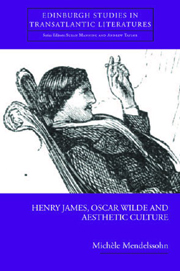Book contents
- Frontmatter
- Contents
- Acknowledgements
- List of Abbreviations
- List of Figures
- Dedication
- Introduction
- 1 ‘I Have Asked Henry James Not to Bring his Friend Oscar Wilde’: Daisy Miller, Washington Square and The Politics of Transatlantic Aestheticism
- 2 The Gentle Art of Making Enemies and of Remaking Aestheticism
- 3 The School of the Future as well as the Present: Wilde's Impressions of James in Intentions and The Picture of Dorian Gray
- 4 ‘Wild Thoughts and Desire! Things I Can't Tell You – Words I Can't Speak!’: The Drama of Identity in The Importance of Being Earnest and Guy Domville
- 5 Despoiling Poynton: James, the Wilde Trials and Interior Decoration
- 6 ‘A Nest of Almost Infant Blackmailers’: The End of Innocence in The Turn of the Screw and De Profundis
- Bibliography
- Index
1 - ‘I Have Asked Henry James Not to Bring his Friend Oscar Wilde’: Daisy Miller, Washington Square and The Politics of Transatlantic Aestheticism
Published online by Cambridge University Press: 12 September 2012
- Frontmatter
- Contents
- Acknowledgements
- List of Abbreviations
- List of Figures
- Dedication
- Introduction
- 1 ‘I Have Asked Henry James Not to Bring his Friend Oscar Wilde’: Daisy Miller, Washington Square and The Politics of Transatlantic Aestheticism
- 2 The Gentle Art of Making Enemies and of Remaking Aestheticism
- 3 The School of the Future as well as the Present: Wilde's Impressions of James in Intentions and The Picture of Dorian Gray
- 4 ‘Wild Thoughts and Desire! Things I Can't Tell You – Words I Can't Speak!’: The Drama of Identity in The Importance of Being Earnest and Guy Domville
- 5 Despoiling Poynton: James, the Wilde Trials and Interior Decoration
- 6 ‘A Nest of Almost Infant Blackmailers’: The End of Innocence in The Turn of the Screw and De Profundis
- Bibliography
- Index
Summary
At a Whistler exhibition, the mischievous painter brought the Punch caricaturist George Du Maurier face to face with the twenty-six-year-old Oscar Wilde, who was widely assumed to be the model for Du Maurier's enormously popular aesthetes, Postlethwaite and Maudle. ‘Which one of you two invented the other, eh?’ Whistler asked, relishing the incisiveness of his facetious inquiry. Whistler's chicken-and-egg question encapsulated the public's curiosity about the enigmatic origins of Punch's popular images of aesthetes by implying that Wilde and Du Maurier had created each other. Whistler was probably right to think that Du Maurier's caricatures of aesthetes had contributed as much to his own success as to Wilde's. Heralded as the real Postlethwaite and Maudle of Du Maurier's lampoons, Wilde's phenomenal artistic and social pretensions provided the material for Du Maurier's popular tongue-in-cheek tributes. Attempting to evade this connection, Du Maurier denied that Postlethwaite was a caricature of Wilde and, in later years, claimed the character was founded on the whole aesthetic school. For his part, Wilde saw the association as an opportunity and unabashedly told the New York Daily Tribune:
As to Du Maurier's characters, I suppose that I am the original of Mautle [sic], the poet. Postlethwaite, the artist, has no original, but is a combination of the peculiarities of a number of my friends. As an artist, my attitude toward all this is that a true artist who believes in his art and his mission must necessarily be altogether insensible to praise or blame. If he is not a mere sham, he cannot be disturbed by any caricature or exaggeration.
- Type
- Chapter
- Information
- Henry James Oscar Wilde and Aesthetic Culture , pp. 22 - 89Publisher: Edinburgh University PressPrint publication year: 2007

